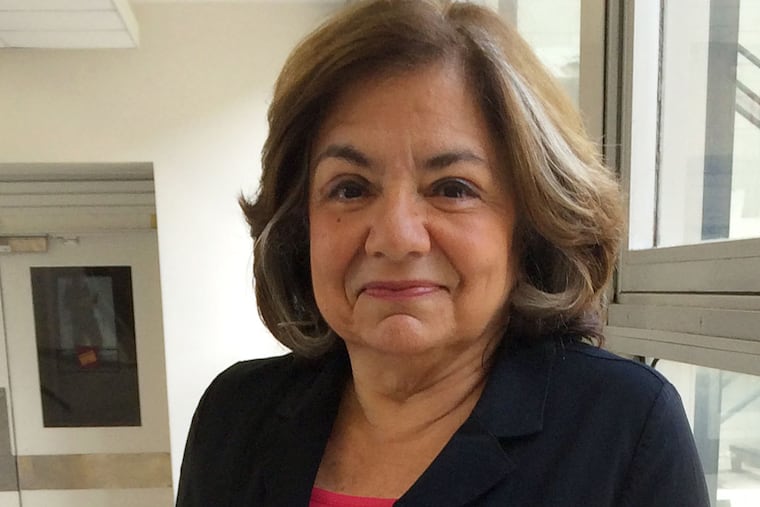The Interview: Fran Visco
On the second day of Breast Cancer Awareness Month, the Philly-based breast cancer advocate Fran Visco did not buy a pink blender.

ON THE SECOND day of Breast Cancer Awareness Month this year, the Philly-based and nationally prominent breast cancer advocate Fran Visco did not buy a pink blender. Instead she fired a shot across the bow on the Huffington Post, writing: "All the pink gadgets in the world will not end breast cancer."
Visco is president of the National Breast Cancer Coalition and "may be the most influential nonscientist ever in the field of breast cancer research," according to Science magazine. She's also a breast-cancer survivor, which is how the former lawyer (out of Villanova Law School and St. Joseph's University . . . and West Catholic Girls' High and St. Donato Elementary) first came to the cause.
Her crowning achievement is a program, run through the Department of Defense of all places, that has awarded $3 billion in grants since 1992 to daringly innovative research (including work behind the breakthrough drug Herceptin). The program brings breast cancer survivors to the table, alongside scientists, to decide how the money gets spent.
In her Huffington Post salvo, Visco noted that breast cancer continues to kill almost 110 women in the U.S. a day - down some but not much from the 120 a day who died in 1987, when she was diagnosed. Instead of promoting more "awareness," which she says breeds complacency, Visco and the coalition are now lighting fires under scientists to fast-track a breast-cancer vaccine. NBCC is also applying its considerable influence to fund research that aims to stop breast cancer tumors from spreading.
Visco, 66, lives in Bella Vista with her lawyer husband Arthur Brandolph. Their 28-year-old son, David, is in law school at Temple. She spoke with Becky Batcha.
Q If I'm doing the math right, it's possible you were diagnosed with breast cancer the same year your son was born.
He was 14 months old. He was born June 1986. I received my diagnosis in September 1987.
Q What was the single worst moment during that time?
I think it took about a month until it really struck me. My fear was that I wasn't going to live to see 40 and I wasn't going to live to see my son grow up. That was the worst.
Q You had a 14-month-old, so there must have been wonderful moments as well.
Oh, yes. Absolutely. I didn't have a cloud of doom and gloom over me every moment of the day. I tried very hard to continue to be a full-time lawyer and full-time mother and full-time wife. There were many wonderful moments.
Q How did you come to switch careers from law to breast-cancer advocacy?
I started volunteering with the Linda Creed Breast Cancer Foundation here.They were invited to come to a meeting in Washington, D.C. - this was in about 1991 - to hear an idea about launching a coalition to do the political advocacy work in breast cancer, modeled on the AIDS movement.
They asked me to run as the first president. I said no. I said no many times. Then I said the most ridiculous thing I've ever said: "I will do it if you promise me it will not interfere with my law practice." So I was elected and it took over my life.
Q Had you already reached out to the DOD?
Yes. You know, there are many runs and races and dinners that raise money for breast cancer research - and they're all important. But real money, year in and out, comes from federal appropriations. So we said that's what we're going to focus our efforts on.
We were successful [winning some $300 million in their first congressional appropriation], but Sen. Tom Harkin, who was then the chair of the Appropriations Committee, said to me, "I can't do all of it in the domestic budget." So we got $210 million in the defense budget.
I took a group of advocates to Fort Detrick, Md., to meet with Gen. Richard Travis, who was really a visionary general, and he said, "You want to do this differently? You want a seat at the table?"
He said, "Ladies, I'm going to lead you into battle, and we're going to win."
Q What made you think scientists and legislators would want survivors at the table?
I never thought about what they would want. What we thought about was: What's the best way to get to the goal? We were bringing all this money. We needed a say.
Q Who instilled in you this incredible confidence?
It was my mother. She was a registered nurse. She was a head nurse at a couple different hospitals in Philadelphia. My sisters and I were raised to know women could do anything. My grandmother was the same way, this little Italian lady.
Q Is it realistic to hope for a breast-cancer vaccine in, say, the next 15 years?
Oh, yeah. I think it will be in clinical trials much sooner than that - within three to four years.
Q When you're not fast-tracking a breast cancer vaccine, do you have any hobbies?
My hobbies are watching my son play Ultimate Frisbee and reading. He has a club team, and then he played this year with the pro league, for the Philadelphia Spinners. I used to be a basketball mom [at Seger Park, where David played in youth leagues], and now I'm an Ultimate Frisbee mom.